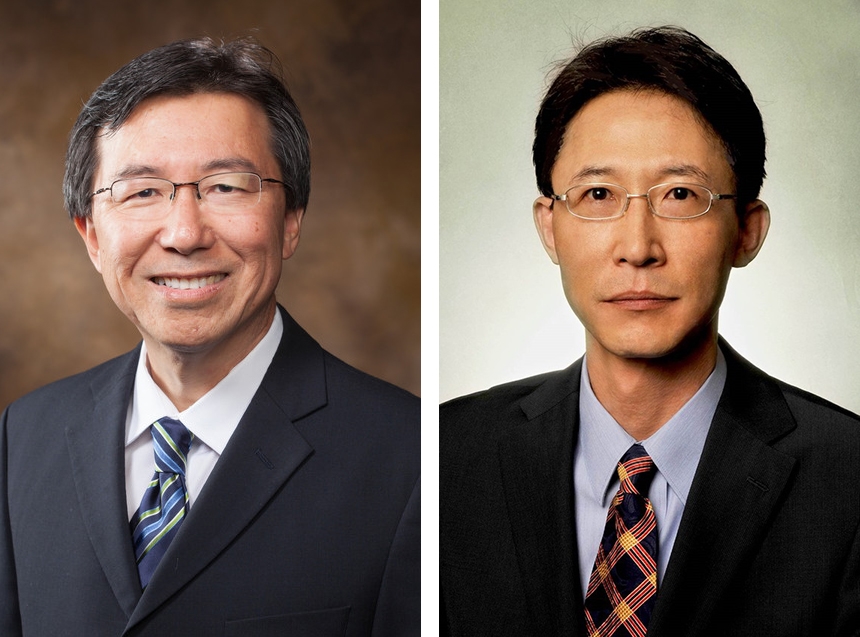
Imagine going to the doctor for an annual physical, and instead of drawing blood, the doctor could sequence your genome and give you a report about which medical issues you might face in the years ahead. A pair of University of Arkansas engineering professors are working together, with support from the National Institutes of Health, to make that prospect more realistic.
Steve Tung, professor of mechanical engineering, and Jin-Woo Kim, professor of biological engineering, have received a grant from the NIH's Human Genome Research Institute to develop nanoscale technology designed to make DNA sequencing faster, cheaper and easier.
DNA sequencing is the process of determining the order of nucleotides within a DNA molecule, which can give valuable genetic information to doctors, biologists and forensic investigators, among other groups.
The grant is for approximately $400,000.
The base of the research builds on the concept of nanochannel measurement, in which individual strands of DNA pass through a tiny channel. The passage of those strands interrupts an electrical current and a sensor detects the nature of the interruption, telling scientists which nucleotide has passed through the channel.
It's a concept that has existed for nearly 20 years, but still has not been perfected.
The challenge, Tung said, is the size.
"With sensors, you generally want the sensor to be smaller than the thing it's sensing," he said. "So when you're sensing DNA, that means you're at less than 1 nanometer."
If the sensor is too large, Tung said, it diminishes the accuracy of the results.
One goal of the research is to use the relatively new material known as graphene to build a sensor. Graphene is transparent, extremely flexible and 100 times stronger than steel.
But to do that, Tung and Kim will have to find a way to reduce a sheet of graphene to a single strand. Researchers believe a single chain will be more effective at recording the DNA sequence.
The second issue Tung and Kim will confront is how to draw single strands of DNA through the measurement channel in a consistent way. Their answer to that problem is a unique convergence of atomic force microscopy, or AFM, and a protein known as DNA polymerase or DNA helicase.
"We're looking at using AFM to drag the DNA, while the enzyme unwinds DNA, across the sensing element in a way that can control the speed and orientation of the DNA to help ensure accurate measurement," Kim said.
The research is possible because of Tung and Kim's unique combination of skills.
"It is an excellent example of interdisciplinary approach to solve problems," Kim said. Kim describes himself as a "hybrid" who was trained both as a biologist and as a biological and chemical engineer. He said the project is a perfect fit to his research thrust, advancing science and engineering through novel hybrid technology developments by cleverly interfacing biology and engineering.
Tung's involvement in the project is unique, he said. It's rare for mechanical engineers to receive funding from the National Institutes of Health, because NIH projects typically fall more directly under the field of biomedical engineering.
But that mindset is changing, Tung said.
"If a freshman student wanted to pursue something in the field of health, previously they would never be directed to mechanical engineering," he said. "People would say 'that's just for building cars,' but projects like this are a great fit.
"This project involves materials, it's manufacturing, it's system integration, those are all mechanical engineering principles. It's all just at the nano scale."
"If mechanical engineers were involved in the past, it was typically in a support role — studying the mechanics of biosystems," Tung said. "But interdisciplinary nanotechnology, specifically bio-nanotechnology, offers a way for mechanical engineers to take a lead in a project like this."
Tung and Kim said they think interdisciplinary approach is the future of engineering, and the NIH award will allow the pair to bring in graduate students and a postdoctoral researcher to assist with the project.
Topics
Contacts
Steve Tung, professor and graduate programs coordinator
Mechanical Engineering
479-575-5557, chstung@uark.edu
Jin-Woo Kim, professor
Biological and Agricultural Engineering
479-575-3402, jwkim@uark.edu
Nick DeMoss, director of communications
College of Engineering
479-575-5697,
ndemoss@uark.edu